9 - The Transition Between the Possible and the Real: Nature as Contingency in Hölderlin's ‘The declining fatherland …’
Published online by Cambridge University Press: 08 October 2020
Summary
Hölderlin's essay fragment ‘The declining fatherland …’ represents a transitional text in several respects. On the one hand, it concludes the grand project of a modern tragedy that Hölderlin had pursued through three versions of The Death of Empedocles. On the other, the historical-philosophical reflections undertaken in the fragment provide the theoretical point of reference for the hymns and the late Sophocles translations. The text reflects the tragedy project and lays the poetological and historical-theoretical foundations for the hymns. Thus it corresponds in Hölderlin's work to that which he discusses: to the transitional. At the centre of this transition – such, at least, is the thesis pursued here – stands a transformed view of the relationship between humanity and nature that Hölderlin had first gained step-by-step in his work on the Empedocles project and which becomes a historical-philosophical model in the essay fragment. This model allows the fragment to conceive of revolutionary upheavals from the modern paradigm of reality and possibility in the sense of contingency rather than from the schema of tragic entanglement. In this paradigm, nature can no longer be thought of as the All in All [das All-Eine] that, as the other to the finiteness and mortality of human life, constitutes life's source. In place of the still predominant ‘regressive utopia of the immediacy of nature’ at the beginning of the Empedocles complex, in which it is a matter of restoring the original intimacy with nature, there arises an attempt to find forms of representation for dealing with the loss of such intimacy.
This development can already be traced through the different versions of The Death of Empedocles and in the essay ‘The declining fatherland …’, Hölderlin draws the balance from the attempt to write a modern tragedy as the tragedy of such a loss. In doing so he simultaneously accentuates the relationship between humanity and nature once again, since the ‘All of Nature’ as the foundation of human existence no longer appears to humanity as the other of temporality and history but instead clearly emerges as part of history. Hölderlin arrives at the view that humans are first able to experience the totality of being as the ‘world of all worlds’ (Essays and Letters, 271) in historical upheaval as the transition between possibility and reality in which – and herein lies the modern moment of Hölderlin's conception – this upheaval is experienced as the violent intrusion of contingency.
- Type
- Chapter
- Information
- Hölderlin's Philosophy of Nature , pp. 164 - 177Publisher: Edinburgh University PressPrint publication year: 2020



